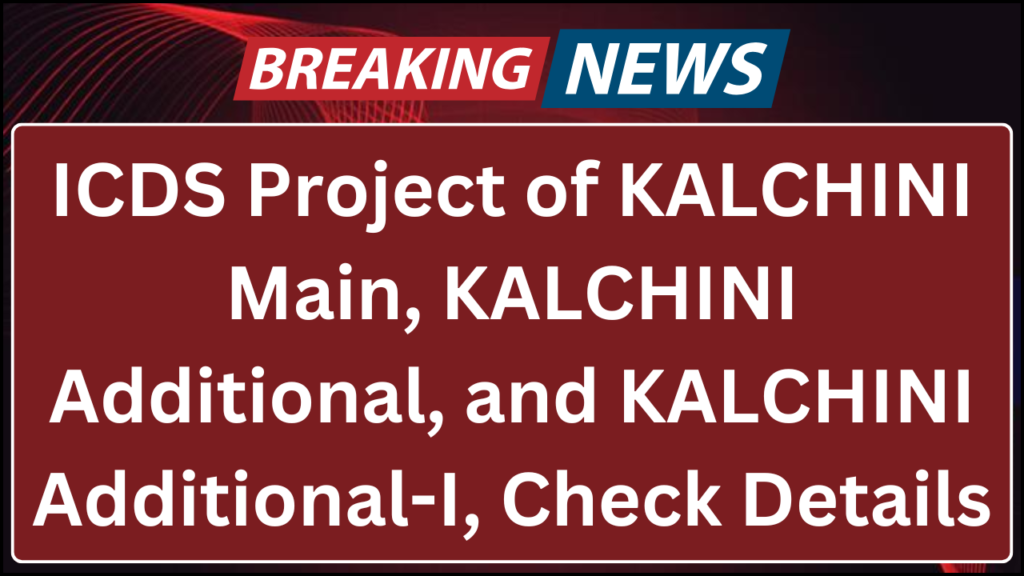
The ICDS Project is a govt initiative project that aims at improving the nutritional and health status of children under 06 years of age and it will look after the pregnant and lactating mothers. The program provides various services, including nutrition, immunization, health check-ups, and preschool education. The ICDS Project of KALCHINI Main, KALCHINI Additional, and KALCHINI Additional-I plays a crucial role in ensuring the well-being of women and children in the region.
Goals of the ICDS Project
The ICDS Project was started with the following key objectives:
- Improve the nutritional status of children below six years, pregnant women, and nursing mothers.
- Reduce child mortality, morbidity, malnutrition, and school dropouts.
- Enhance early childhood care and education for children under six years of age.
- Provide health and nutrition education to mothers for better childcare and feeding practices.
- Offer immunization and regular health check-ups to children and mothers.
- Empower women by improving their health and education status.
Services Provided by the ICDS Project
The ICDS Project of KALCHINI Main, KALCHINI Additional, and KALCHINI Additional-I offers several key services to meet its objectives. These include:
1. Supplementary Nutrition Program (SNP)
This program ensures that children, pregnant women, and lactating mothers receive nutritious food to prevent malnutrition. Food items like rice, wheat, pulses, milk, and fortified supplements are provided to improve overall health and immunity.
2. Immunization
Children and pregnant women receive free vaccinations to protect against diseases like TB, polio, diphtheria, tetanus, measles, and hepatitis. This service is provided in coordination with the health department.
3. Health Check-Ups and Referral Services
Regular health check-ups are conducted at Anganwadi Centers to detect early signs of illnesses, malnutrition, and developmental delays. In case of serious health issues, referrals are made to govt hospitals for advanced treatment.
4. Pre-School Education
The ICDS program includes a non-formal education component for children aged 3-6 years. Through fun activities, storytelling, and games, children develop cognitive and social skills, preparing them for formal schooling.
5. Nutrition and Health Education
Mothers are educated on proper breastfeeding practices, balanced diets, hygiene, and sanitation. This helps in reducing infant and maternal mortality rates and promotes better childcare.
6. Adolescent Girls’ Scheme
Under this scheme, adolescent girls receive guidance on nutrition, personal hygiene, reproductive health, and skill development, helping them grow into healthy and independent individuals.
Implementation of the ICDS Project in KALCHINI
The ICDS Project of KALCHINI Main, KALCHINI Additional, and KALCHINI Additional-I is implemented through a network of Anganwadi Centers (AWCs) spread across villages and urban areas. These centers serve as the primary contact points for delivering ICDS services.
- Each Anganwadi Center (AWC) is managed by an Anganwadi Worker (AWW) and a helper, who are responsible for delivering services such as food distribution, preschool education, and conducting awareness sessions.
- The centers coordinate with local health workers and ASHA (Accredited Social Health Activists) to ensure proper health monitoring and immunization.
- Special focus is given to tribal and economically weaker sections to ensure they benefit from the program.
Impact of the ICDS Project
The ICDS Project of KALCHINI Main, KALCHINI Additional, and KALCHINI Additional-I has had a positive impact on the community. Some key benefits observed include:
- Reduction in malnutrition rates among children due to regular nutritional support.
- Improved maternal health through education on proper nutrition and hygiene.
- Increased immunization coverage, leads to a decline in preventable diseases.
- Higher school enrolment rates due to pre-school education at Anganwadi Centers.
- Better awareness among mothers and adolescent girls about health, hygiene, and childcare practices.
- Stronger community participation, as local women are employed as Anganwadi Workers, empowering them financially and socially.
Challenges and the Way Forward
Despite its success, the ICDS Project in KALCHINI faces some challenges:
- Limited infrastructure at Anganwadi Centers, leading to space constraints.
- Irregular supply of nutritional supplements in some areas.
- Lack of awareness among some rural populations about the benefits of ICDS services.
To address these challenges, the govt and local authorities need to:
- Improve infrastructure and provide necessary resources to Anganwadi Centers.
- Ensure timely distribution of food and medicines.
- Conduct training programs for Anganwadi Workers and health staff.
- Organize awareness campaigns to reach more people in remote areas.